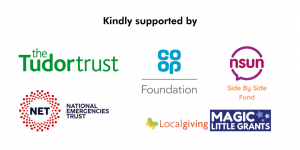When someone you love dies, a lot of people around you want to say “the right thing”. They want to cheer you up, distract you from your loss and protect you from the crushing reality of bereavement (more on those problems later). So a lot of them say, “well at least…”
If you’re bereaved, I’m sure you’ve heard something like this before:
- “At least she wasn’t in pain.”
- “At least he held on until after your exams.”
- “At least they haven’t had to experience Covid-19.”
- “At least she wasn’t your only sister.”
- “At least you still have your mum.”
They sound ridiculous, written here. Yet they are an all too familiar response from someone trying to help a bereaved friend or family member. Everyone wants to fix you.
“I will try to fix you” sings Chris Martin in everyone’s favourite sad song
The problem with “at least”, is that it reduces your pain and suggests that you shouldn’t be grieving. The trauma of bereavement needs to be socially acceptable. We need to be ok with the fact that people are hurting, and should be able to wallow in that grief for as long as they need.
The fact that often one of the first things people hear after a bereavement is “well, at least….” fundamentally shows that that person is not willing to accept their sadness and is dragging them immediately out of their grief and back into dangerous “I’m fine” territory. Aren’t our British taboos just great?!
“At least she hung on until you’d all finished your exams”
A well-meaning person close to me said those words very soon after my mum died. “At least she hung on until you’d all finished your exams”. My mum died in July 2015, just after I’d finished my second year of university, my sister had finished her A-Levels and my brother had finished his GCSEs. I see their point – mum dying in the middle of those exams would have been a nightmare. But I am also offended by their inability to see that ANY time for my mum to die is a nightmare. There is no silver lining in her dying in July and not June.
Also, please do not suggest that she worked hard to live until July, and then gave up. My mum was fighting for her life until the very end, and never gave up that fight. The idea that people are “strong” and “fighters” if they survive is suggesting that those who die are ‘weak’ or didn’t fight hard enough. That’s not how death works – it snatches life from us however much we want to live. It is a game of luck, not of strength.
What can you say instead?
Instead of saying “at least she wasn’t in pain”, and presuming this is helpful, try to reframe your point by asking the bereaved person – “does it help that you know she wasn’t in pain?”. Give them the space to explain their grief and talk openly about their feelings with you. This validates their grief and shows you are a safe person they can speak to if they are struggling.
Instead of saying, “at least you still have other siblings”, ask the person how they are feeling having lost a sibling, and allow them to reflect on how the family dynamic has changed. Ask them in particular how their remaining siblings are coping and offer ideas for remembering and celebrating the sibling they have lost. Acknowledge their grief but understanding that sibling loss is particularly traumatic as a young person and the remaining family members could never fill the hole that loved one has left.
If you say the wrong thing, that’s ok!
Being a good grief friend is all about listening, and supporting your friend to understand their grief. Assumptions and “at least” comments can be unhelpful even if you are trying to be kind. Remember that each grief is unique so the best thing to do is ask your friend how they are feeling and to actively listen to the words they are using and the emotions they are expressing. Let them speak without interruption and try to mirror their language so that you are creating a space in which they feel safe and loved.
Finally, don’t worry if you get things wrong, or you don’t know what to say. Grief is unique, so everyone will appreciate different types of support, and if you say the wrong thing, that’s ok! Try and learn from your friend by asking them how you can be more helpful and what they need right now in their grieving journey. Just by reading this blog you are doing amazing, and on behalf of all grieving pals – thank you so much for caring for us, loving us, and trying to better understand our grief.
Beth French
If you’d like to learn more about Let’s Talk About Loss, or attend a meet up to talk about your grief, you can find out more here.


